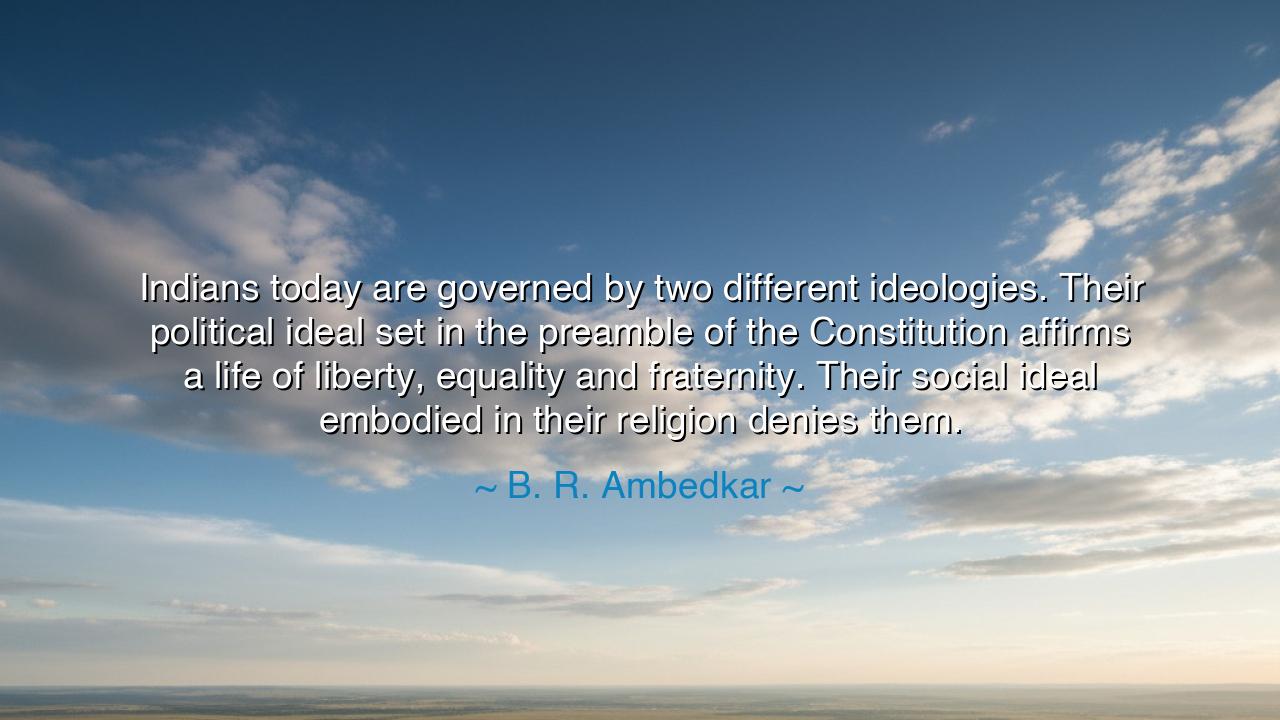
Indians today are governed by two different ideologies. Their
Indians today are governed by two different ideologies. Their political ideal set in the preamble of the Constitution affirms a life of liberty, equality and fraternity. Their social ideal embodied in their religion denies them.






In the powerful and unflinching words of B. R. Ambedkar, the architect of modern India’s Constitution, we hear the clash between two worlds: “Indians today are governed by two different ideologies. Their political ideal set in the preamble of the Constitution affirms a life of liberty, equality, and fraternity. Their social ideal embodied in their religion denies them.” These words, though spoken decades ago, still tremble with truth. They capture the agony of a nation divided between its dreams and its habits—between what it has promised to become and what it refuses to let go.
The origin of this declaration lies in Ambedkar’s own life, carved from the stone of suffering and intellect. Born into the caste once called untouchable, he climbed the mountain of education to become the chief draftsman of India’s Constitution. He wrote of equality with the faith of a man who had tasted its absence. When he spoke of liberty, equality, and fraternity, he was not invoking mere words—he was invoking the trinity of human dignity. Yet, even as he helped craft a document that enshrined these ideals, he saw with sorrow that the chains of social hierarchy, particularly the caste system, still bound the hearts of his people. Thus, his words are not just criticism—they are prophecy and warning.
Ambedkar knew that law and society do not evolve at the same pace. Political equality—the right to vote, to participate, to speak—can be granted in a moment. But social equality, the acceptance of one human being by another as equal, demands generations of courage and transformation. In his observation, he reveals a tragic contradiction: the same people who salute liberty in public often deny it in private. India had abolished caste discrimination in law, but it lived on in temples, homes, and marriages. He saw that unless the soul of the nation embraced the spirit of equality, the letter of the Constitution would remain hollow.
Consider the story of Mahatma Jyotirao Phule and his wife Savitribai Phule, who, a century before Ambedkar, opened schools for girls and lower-caste children. They faced stones, insults, and exile, yet they persisted. Their fight was not for political power but for social awakening, for they understood that the true revolution must begin in the mind. Ambedkar, inheriting that legacy, realized that democracy cannot thrive on the surface while oppression festers beneath. Like a tree whose roots rot while its branches flourish, a nation divided by prejudice cannot stand long.
Ambedkar’s insight also speaks beyond the borders of India. It addresses a universal truth: that every society lives in tension between its ideals and its instincts. America, founded on liberty, once thrived on slavery; Europe, the birthplace of enlightenment, also birthed colonization. Everywhere, the struggle between moral vision and material practice continues. The human heart is slow to evolve, even when the mind has leaped ahead. Thus, Ambedkar’s voice transcends his time and place—it becomes the cry of all who strive for harmony between what is written in law and what is lived in truth.
Yet, his words are not words of despair. Beneath his stern warning burns a hope fierce and unwavering—that change, though slow, is possible. He believed that education, reform, and moral courage could bridge the divide between constitutional ideals and social reality. The path he urged was not one of vengeance but of enlightenment: to awaken the conscience of the people so that the soul of India might one day match the beauty of its Constitution.
So let this lesson be passed down to all generations: a nation’s greatness lies not in its wealth or its monuments, but in its moral consistency. When the values of liberty, equality, and fraternity are not only written in laws but lived in lives, then true democracy is born. Every citizen, therefore, must become a reformer in their own heart—challenging prejudice where it hides, extending dignity where it is denied, and practicing fraternity even when it demands humility.
And thus, through the enduring wisdom of Dr. B. R. Ambedkar, we are reminded that the real revolution is not fought in parliaments or courts, but in the conscience of humankind. Let every soul strive to make its inner world worthy of the freedom it demands in the outer world. Only then will liberty be complete, equality be real, and fraternity eternal.






AAdministratorAdministrator
Welcome, honored guests. Please leave a comment, we will respond soon